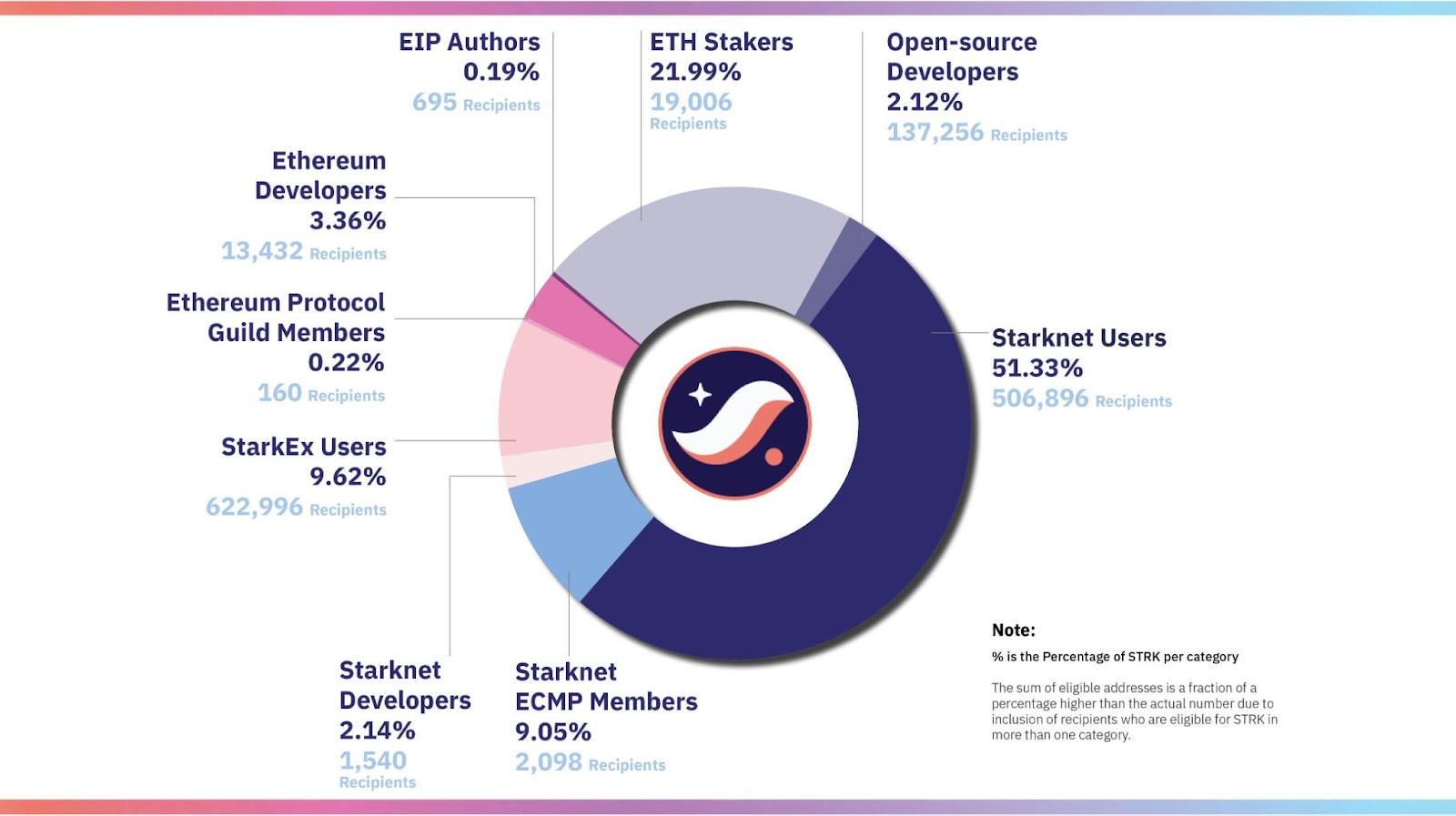Layer-2 Chain Starknet, a prominent Ethereum scaling solution, is generating substantial anticipation with its forthcoming STRK token airdrop scheduled for next week. This event marks a significant milestone for Starknet as it prepares to distribute a total of 1.8 billion STRK tokens, encompassing both the airdrop allocation and additional incentives for DeFi participants.
The airdrop, which is slated to include 728 million coins, is poised to captivate the crypto community as Starknet continues to gain traction in the realm of Layer-2 solutions. Amidst escalating excitement and surging metrics, Starknet’s deposits have reached an all-time high, reflecting the fervor surrounding the imminent distribution of STRK tokens.
Starknet set to launch long-awaited STRK token airdrop
Starknet Foundation stated on Wednesday that STRK, the native token for the Ethereum layer-2 blockchain Starknet, will be airdropped on February 20 to around 1.3 million wallets.
According to the foundation, a wide range of users are eligible for the 728 million token airdrop, or “provisions,” and have until June 20 to claim their tokens.
Provisions celebrates our community’s hard work in showing how we can and should scale Ethereum for mass adoption.
Diego Olivia, CEO of Starknet Foundation
Starknet is a layer-2 blockchain that uses zero-knowledge cryptography. The long-awaited STRK coin will be used to drive “community participation and project governance,” according to a Starknet Foundation news release.
Diego Oliva, CEO of the Starknet Foundation (SNF), stated that the goal is to establish an inclusive precedent.
This technology is new and potentially impactful for applications across industries, and many leaders in related technological spaces deserve to have a stake in what’s to come.
Diego Olivia
What is the order of the token distribution?
The criteria for the STRK airdrop are divided into three categories: Starknet users, developers, and ecosystem contributors; Ethereum builders and stakeholders; and non-Web3 open-source developers.
The scope of people who qualify is unique for an airdrop, including those outside the local Starknet ecosystem, such as Ethereum solo-stakers and liquid staking token users. The foundation bases its eligibility on the fact that Ethereum safeguards Starknet.
The SNF is issuing STRK as part of its role in promoting Starknet adoption, but unlike many community incentive initiatives, the token has a purpose beyond governance in the network.
Yes, STRK holders will be able to vote on key protocol changes, but they can also use STRK to pay network fees (or gas) instead of ETH. The currency is also anticipated to contribute to Starknet’s security in the future through staking, similar to how ether does on the Ethereum mainnet today.
A broad range of Starknet users, contributors, and developers will be able to claim a portion of the 900 million STRK tokens on offer, accounting for 9% of the total supply of 10 billion.

The foundation also stated that for individuals who did not qualify for this airdrop, “there will be further provisions in the future,” implying that there will be additional airdrops.
“We see how much attention this is bringing to Starknet, and we’re flattered,” said Eli Ben-Sasson, CEO of StarkWare, the principal development firm behind Starknet and member of the Starknet Foundation’s board of directors.
In absolute terms, the highest allocation is reserved for approximately 2,000 users who qualified for Starknet’s Early Community Members’ Program (ECMP), with some earning up to 180,000 tokens.
The cash value of the tokens is unknown because they are not currently trading. Still, comparable layer-2 networks Arbitrum (ARB), Optimism (OP), and Polygon (MATIC) have fully diluted valuations ranging from $8 billion to $20 billion.
Starknet sought to adjust token eligibility rules to minimize Sybil attacks on the airdrop. The SNF stated that the criteria for user contributions notably restrict repetitive processes like Sybils and bots.
 cryptopolitan.com
cryptopolitan.com
